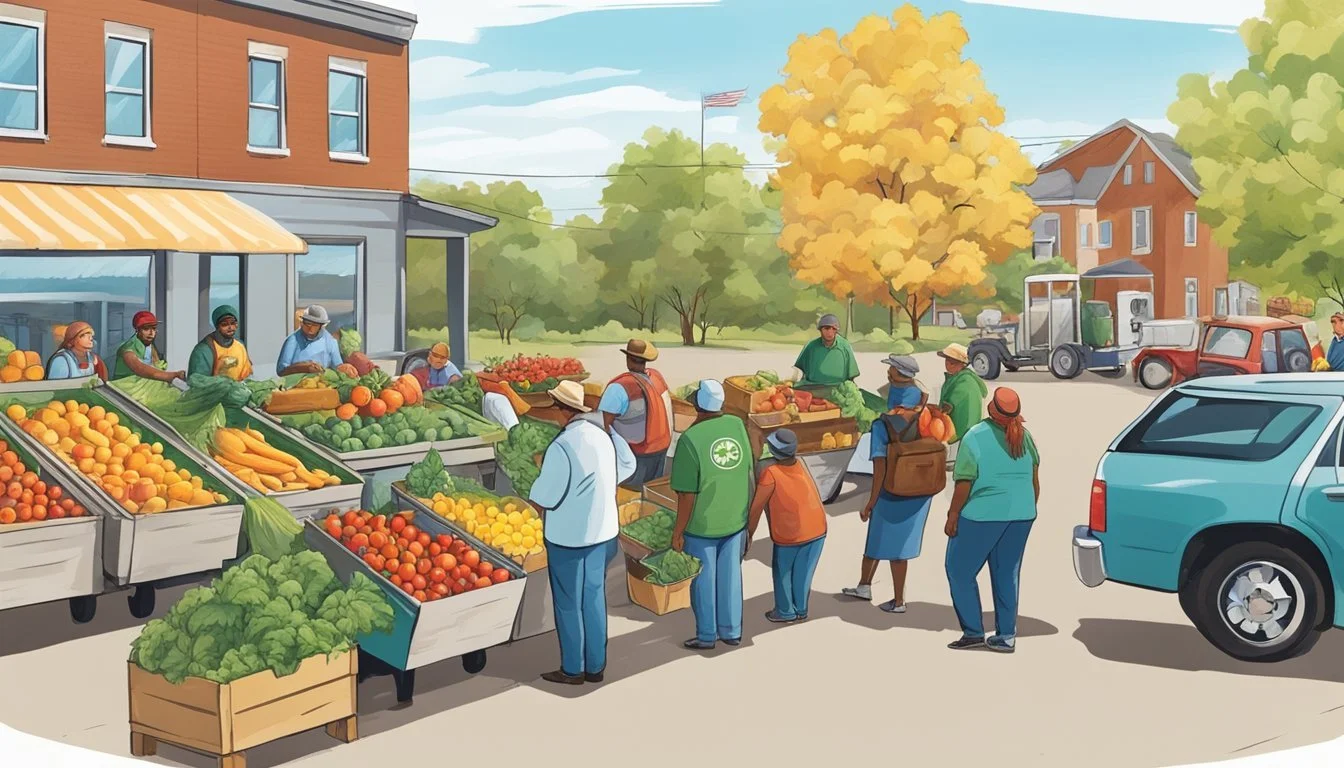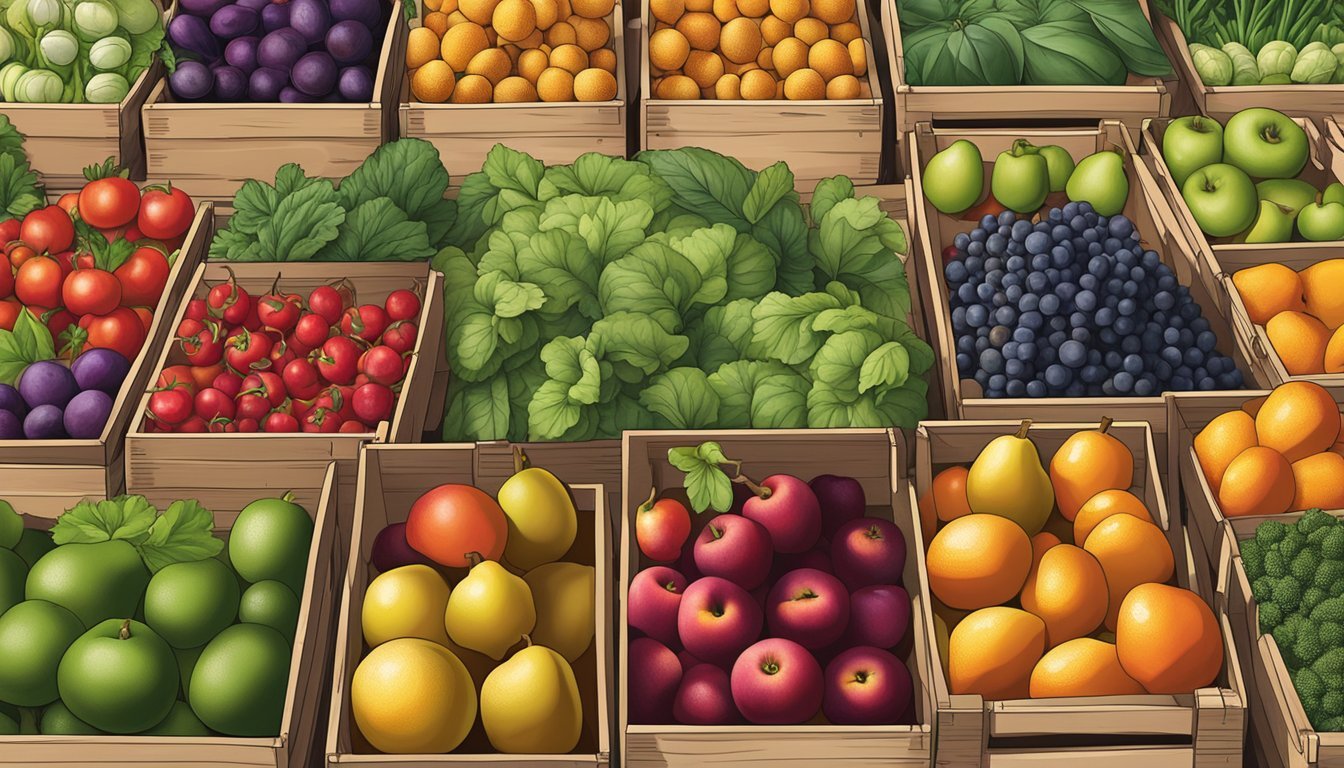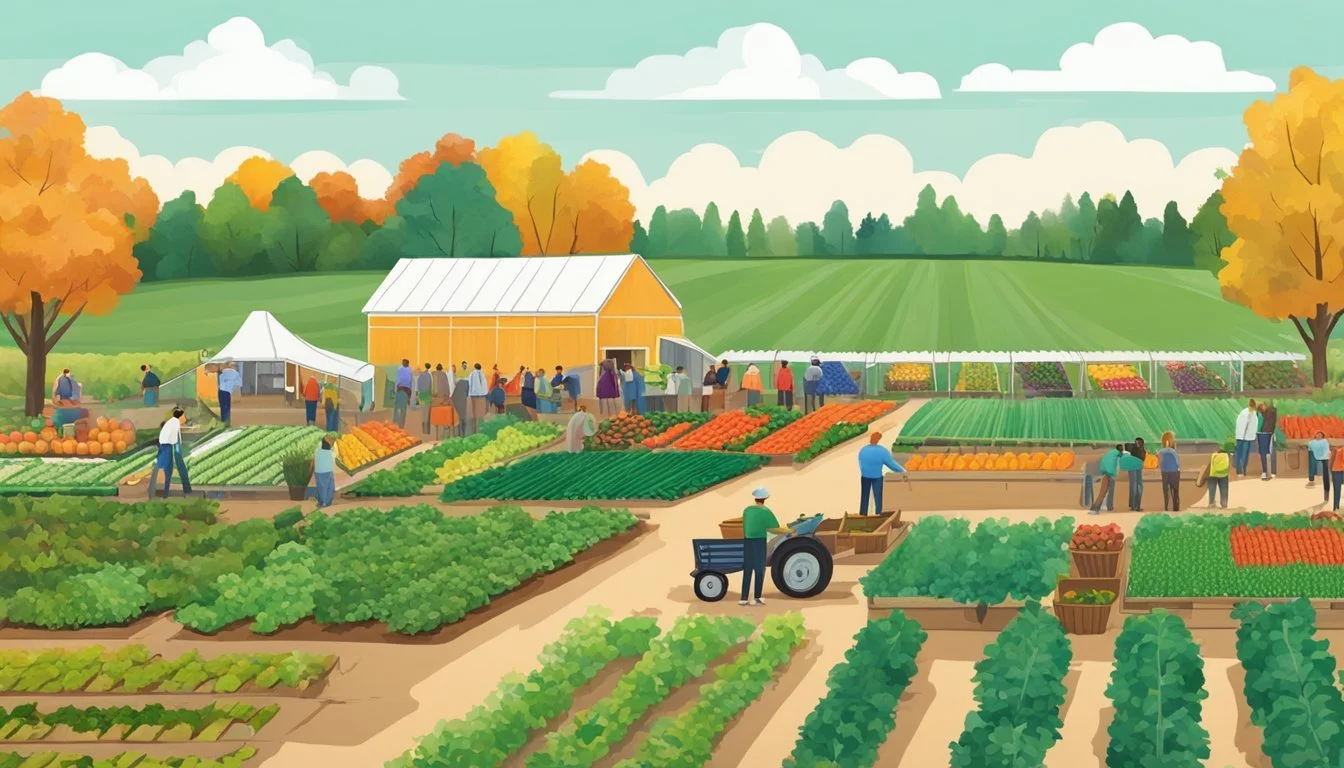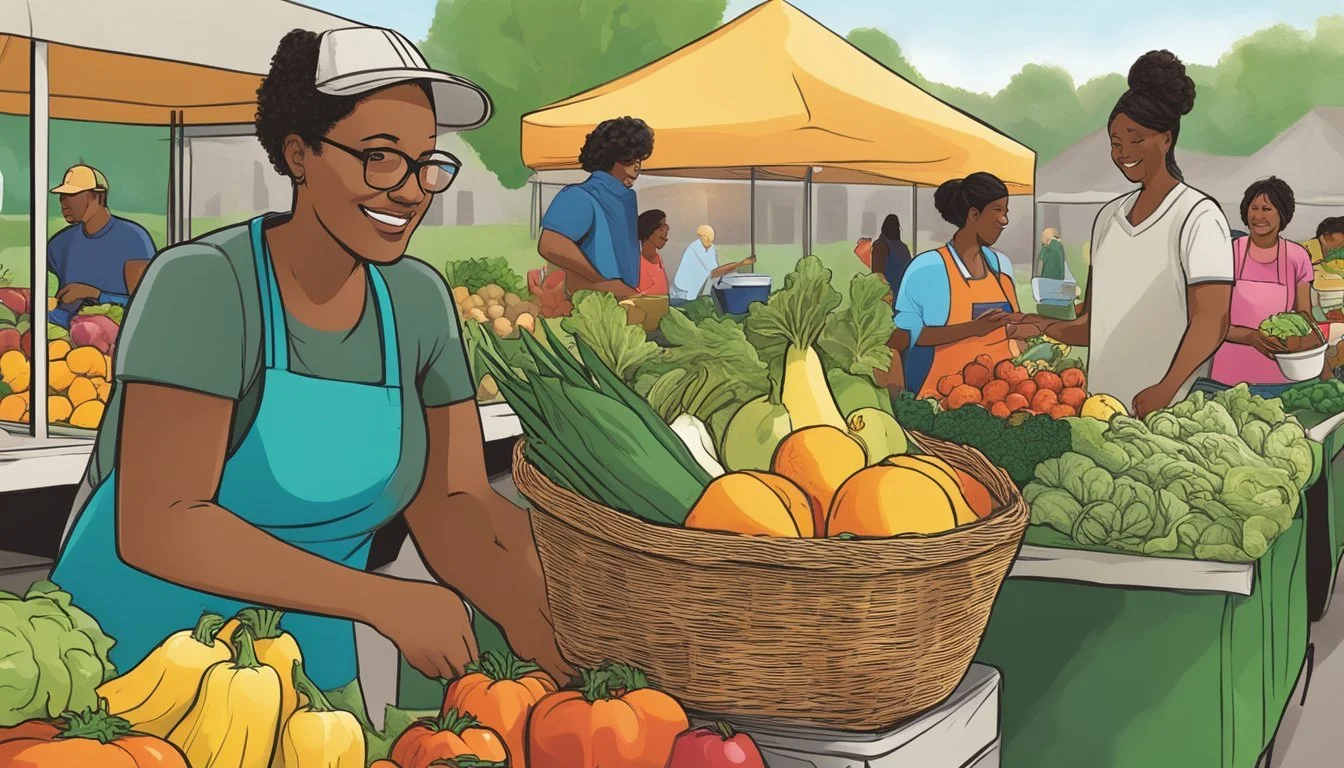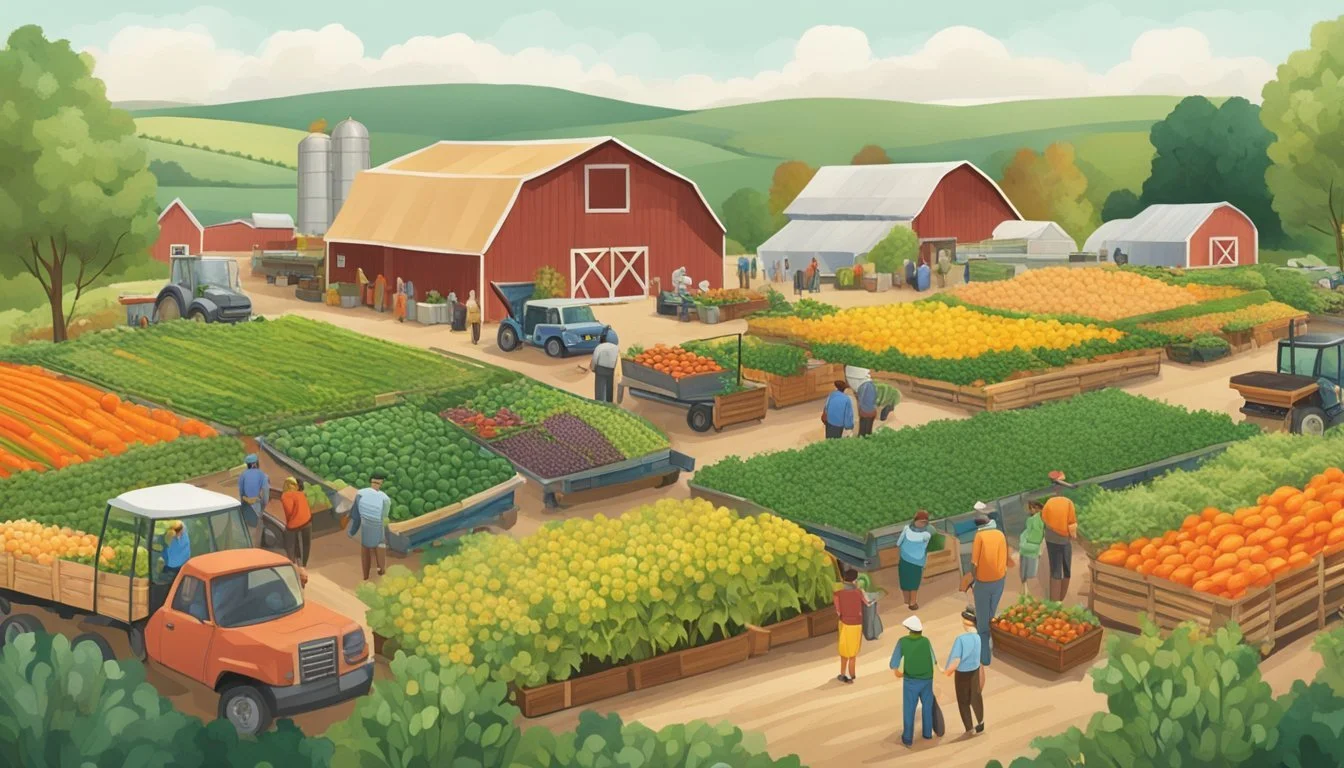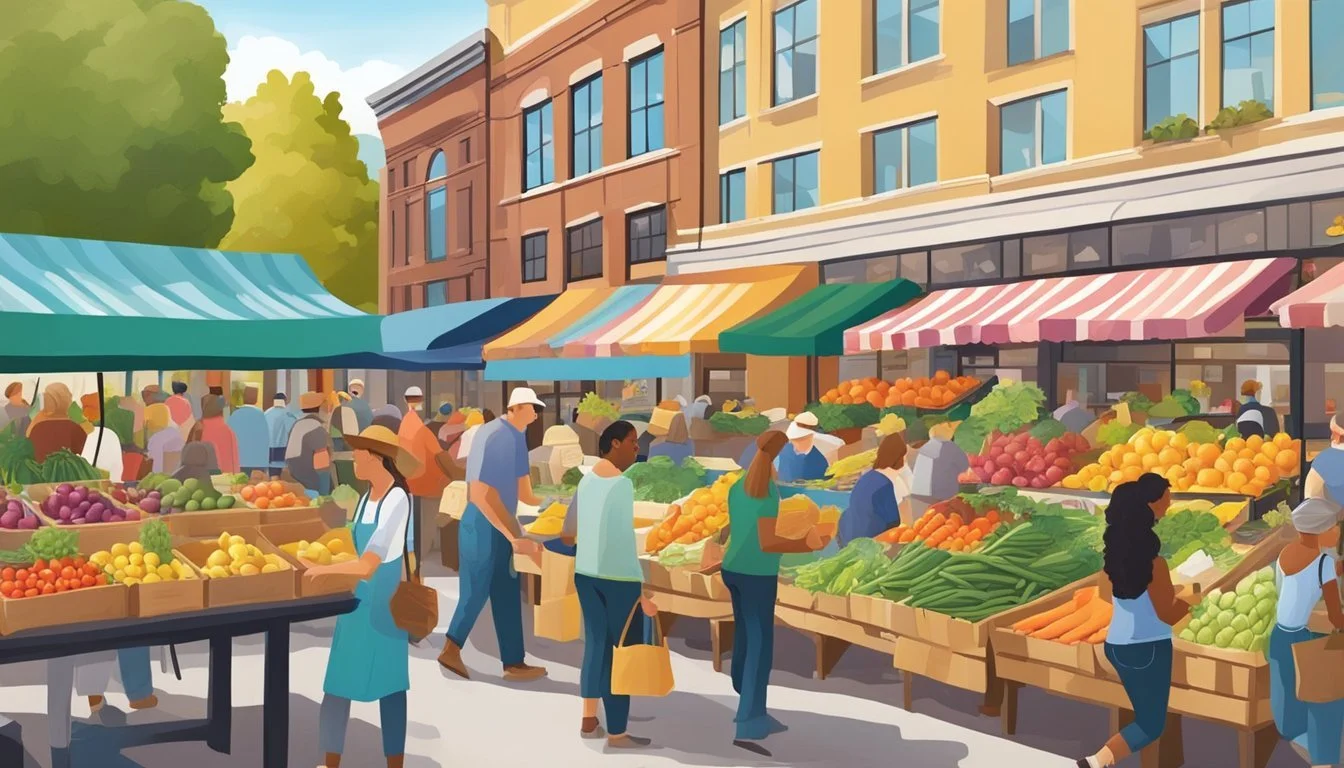Community Supported Agriculture in Rochester, MN
A Guide to Local CSAs
Community Supported Agriculture, commonly known as CSA, is a farming model that has been embraced in Rochester, Minnesota, as a way to build a direct bridge between local farmers and consumers. In this model, consumers can purchase 'shares' from local farms, and in return, they receive a portion of the farm's produce throughout the growing season. This arrangement allows consumers to enjoy fresh, organic, and locally-grown fruits and vegetables, while also supporting their local farmers by providing them with predictable income and market security.
The concept thrives on mutual benefit: farmers get a dedicated customer base and a fair price for their crops, and consumers get access to high-quality, seasonal produce that is often picked at the peak of its flavor and nutritional value. In Rochester, several organic farms such as Humble Hands Harvest and Pearson Organics operate CSAs, offering customizable CSA shares that may include a wide assortment of vegetables, herbs, and sometimes additional farm products.
Engaging in a CSA in Rochester not only contributes to a sustainable food system, but also fosters community connections. Members often gain a deeper understanding of how their food is grown, and they develop a closer relationship with the land and the farmers who steward it. By participating in CSAs, Rochester residents play an active role in the preservation of local farmland and the economic stability of rural communities.
Understanding CSA
Community Supported Agriculture (CSA) embodies a food distribution model that fosters a direct relationship between farmers and community members. This symbiotic partnership emphasizes shared responsibility and mutual support.
Origins and Concept of CSA
Community Supported Agriculture (CSA) originated in the early 1960s in Germany, Switzerland, and Japan as a response to concerns about food safety and the urbanization of agricultural land. It reached the United States in the 1980s and has since surged in popularity as a sustainable alternative to the conventional food supply system. CSA is predicated on the idea of establishing a proactive partnership between local farmers and community members, which strengthens the local food system and reinforces community ties.
CSA Structure and Membership
The structure of a CSA revolves around membership or shareholders who pledge support to a farm operation, providing a financial base for the farmer. In exchange for their commitment, members receive a regular share of the harvest throughout the agricultural season. The membership agreement usually involves upfront payment, which can alleviate the financial pressures on the farmer early in the season.
Membership Options: Often comprises a range of share sizes suitable for different household needs.
Season Length: Typically spans from late spring through autumn, though this can vary by farm.
Distribution Method: Shares are usually distributed on a weekly or bi-weekly basis at designated locations.
Benefits of Joining a CSA
Joining a CSA offers a suite of benefits to both farmers and community members:
For members:
For farmers:
Financial Security: Early season capital through membership fees.
Market Assurance: A guaranteed market for their produce reduces marketing and sales costs.
For the community:
Strengthened Connection: Building a relationship between the grower and consumers fosters community and understanding of local agriculture.
Education: Members learn about seasonality, sustainable farming practices, and the challenges of food production.
Shared risk and responsibility are inherent in CSA models, as members are often reminded that agriculture is subject to variations in weather and other unpredictable factors. This risk distribution can lead to a stronger sense of connection and commitment to the farm's success and viability within the community.
CSA in Rochester, MN
Community Supported Agriculture (CSA) in Rochester, MN connects residents with fresh, local produce from nearby farms. This model supports the local economy and strengthens the community's food system.
Local CSA Farms in Rochester
Rochester is home to several CSA farms that focus on sustainable and organic practices. Humble Hands Harvest in Decorah offers a variety of vegetable produce while Earth Dance Farm provides fresh, locally-sourced items to Rochester and the Twin Cities. Pearson Organics customizes CSA shares, which are available for pickup in multiple locations including Rochester. These local farms not only supply fresh food but also foster a sense of connection between consumers and the source of their meals.
Seasonal Highlights in Rochester CSA
The CSA season in Rochester typically extends from mid-June to October. During this time, members receive a range of seasonal produce. The summer months burst with tomatoes, berries, and greens, transitioning to root vegetables and squash as the season ends. This cycle allows members to enjoy the freshest food at its peak flavor, supporting both their health and the regional agricultural calendar.
Community Involvement and CSA Impact
The CSA model in Rochester bolsters the local economy by ensuring that farmers are directly supported by community members. It also educates residents about the importance of sustainable agriculture and the impact of their food choices. Participation in CSAs leads to deeper community connections and mutual support between growers and consumers, reinforcing the notion that local farms are, in many ways, the community's farms.
Joining a CSA: Member Perspective
Joining a Community Supported Agriculture (CSA) program in Rochester, MN, offers direct access to fresh, local produce and fosters a relationship with the farming process. Members commit to a season of farming, sharing both the risks and bounties.
Considerations for New Members
When individuals consider joining a CSA, they examine the variety and volume of produce expected throughout the season. They assess the payment structure, often paying for shares upfront, which assists farms in early season planning and expenses. Members should inquire about the types and quantities of vegetables to expect, and understand that the selection may vary with seasonal availability. Attending a farmers market or farm visit can aid consumers in determining if the CSA's offerings align with their family's needs.
Maintaining Active Membership
Once individuals become CSA members, maintaining an active relationship is key. It may include staying informed about the season's progress through newsletters, actively picking up CSA shares, or participating in member events. CSAs often encourage members to volunteer or visit the farm, strengthening the community bond and supporting sustainable local agriculture.
Maximizing the CSA Experience
To get the most out of a CSA membership, consumers should embrace the variety of produce offered, which may include trying new vegetables and recipes. Storing and preserving surplus can extend the benefits of membership beyond the growing season. Members can directly engage with farmers, asking questions to learn more about the food's origins and best use. Also, families might participate in scheduled CSA events or potlucks to deepen their connection with the community and other members.
CSA Farm Operations
Community Supported Agriculture (CSA) farm operations in Rochester, MN, encompass intricate coordination of daily tasks, adherence to seasonal cycles, and proactive risk management to ensure a steady supply of fresh produce to their members.
Day-to-Day Farm Activities
CSA farm operations are characterized by a multitude of daily tasks essential for the maintenance and productivity of the farm. Farmers sow, water, and tend to crops to maintain optimal growth conditions. They must regularly inspect vegetables for signs of pests or disease, taking immediate actions when necessary. Harvesting is a daily activity during peak season, requiring careful planning to meet the weekly distribution schedule for CSA shares.
Sowing and Planting: Selection of seeds appropriate for the season.
Irrigation: Efficient water management, sometimes employing drip irrigation systems.
Weeding: Regular removal of unwanted plants.
Harvesting: Timely picking of vegetables to ensure peak freshness.
Seasonal Farming Rhythms
Seasonal rhythms dictate the tasks on CSA farms. In spring, preparation of land and sowing begin, with farmers often using research and past experience to plan crop rotations and soil management strategies. The summer is pivotal for growth and food production, with longer days allowing for extended work hours. Harvest season peaks in the late summer and early fall, marking a period of abundant yield and distribution of shares to subscribers. Winter is for planning and replenishing the soil, as well as marketing for the next season's subscription.
Spring: Land preparation, planting, initial growth of seedlings.
Summer: Monitoring crop growth, managing pests and diseases.
Fall: Harvesting, distribution to CSA members, preparation for winter.
Winter: Strategic planning, equipment maintenance, marketing for new subscribers.
Managing Farm Risks and Challenges
Farmers confront various risks from weather events, market fluctuations, and operational setbacks. They employ strategies such as crop diversification, investing in hoop houses or greenhouses for season extension, and establishing solid relationships with local farmers markets and families. Organic CSA farms often follow NOFA (Northeast Organic Farming Association) guidelines to mitigate soil and plant health risks. They also balance the number of CSA shares sold with projected food production to manage the expectations of consumers and ensure sustainable farm operations.
Risk Mitigation:
Diversification of crops to avoid total losses.
Use of greenhouses to protect against unfavourable weather.
Operational Strategies:
Precise record-keeping for efficient farm management.
Building a community presence to stabilize market risks.
CSA Produce and Products
In Rochester, MN, Community Supported Agriculture offers a plethora of local farm products, centering on a variety of fresh, seasonal produce. Participants can expect a range of options, from traditional veggies to more unique offerings, and even some non-vegetable items.
Types of Produce Offered
Vegetables: CSA farms in the Rochester area deliver a diverse selection of vegetables. Subscribers can anticipate receiving staples like:
Tomatoes
Cucumbers
Peppers
These vegetables are known for their freshness and flavor, having been picked at peak ripeness. It's also common for CSAs to introduce new vegetables, encouraging members to explore different recipes.
Beyond Vegetables: Eggs, Fruit, and More
Aside from vegetables, CSAs often broaden their selection with other farm products. Items might include:
Free-range Eggs: Known for their rich flavor.
Seasonal Fruit: Such as apples, which are available during specific months.
Flowers: Adding a decorative element to shares.
CSA members appreciate the freshness and variety of these products, which often surpass what's available at local grocery stores.
Choosing and Using CSA Products
When members select their CSA products, they have the opportunity to customize their shares to their preferences. This customization is pivotal, especially for those who enjoy cooking and trying new recipes with fresh food. CSA farms sometimes provide recipes for less common items, assisting members in making the most of their seasonal produce. This approach supports a deeper connection between the farmers who grow the food and the individuals who enjoy it, fostering a community around sustainable agriculture.
CSA Logistics
Community Supported Agriculture (CSA) in Rochester, MN, integrates subscription and payment flexibility, defined pick-up and delivery logistics, and proactive communication with shareholders.
Subscription and Payment Options
CSAs near Rochester offer a variety of subscription options to accommodate the needs of their members. Subscribers can choose between different share sizes, such as full shares for larger households or smaller shares for individuals. Payment plans vary by farm, but typically involve an upfront fee to cover the entire season, which runs from mid-June through October. Some farms may offer payment in installments to spread the cost over a period of time. It is important for potential members to visit the CSA's website or contact them directly for specific details on payment structures.
Pick-Up and Delivery Details
CSA members typically collect their shares at designated pick-up locations throughout Rochester and, in some cases, in the surrounding Southeast Minnesota area. Farms like Pearson Organics offer customizable shares that can be picked up in Rochester, the Twin Cities, or other Southeast Minnesota locations. Specific drop sites are determined by the CSA farms and are communicated to members before the start of the season. Delivery options may vary, with some farms offering home delivery for an additional fee.
Communication with Shareholders
Effective communication is the cornerstone of a successful CSA. Members are kept informed about the status of their shares, changes in pick-up locations or schedules, and any issues that may arise during the farming season. This may be done through newsletters, emails, or social media platforms. Additionally, CSA farms encourage members to engage and provide feedback to foster a strong support system and sense of community. Regular updates about crop conditions, harvest schedules, and CSA events help members feel connected to their food system and the overall health of their CSA membership.
Engagement and Education
In Rochester, MN, Community Supported Agriculture (CSA) programs not only provide fresh, organic produce to their members but also offer avenues for hands-on learning and community interaction. Through community events and farm visits, as well as educational resources and outreach, CSAs foster close ties between the farmers and the local community, enriching both the educational landscape and the local economy.
Community Events and Farm Visits
CSAs in Rochester, MN actively involve the community and their members by hosting various events and encouraging farm visits. Humble Hands Harvest in the nearby town of Decorah, IA, for example, serves Rochester and the surrounding areas by inviting members to visit the farm. These visits allow individuals and families to directly engage with the farm, see where their food comes from, and learn about organic farming practices. Pearson Organics, another local farm, provides multiple pickup points within Rochester and its Southeast Minnesota countryside, facilitating member access to fresh produce and the farm itself.
Tips for Visiting:
Check farm schedules for visitor guidelines and event dates.
Dress appropriately for the farm environment and weather conditions.
Members often participate in seasonal events, share in the harvest, and some CSAs may offer hands-on activities, providing an enriching experience for all ages and bolstering a sense of community ownership and support for local farms.
Educational Resources and Outreach
Minnesota CSAs, including those serving Rochester, MN, put a strong emphasis on educating the community about the importance of sustainable agriculture and the benefits of locally sourced food. Farms often provide members with newsletters, recipes, and workshops that extend their knowledge far beyond the food on their plate.
Educational Offerings May Include:
Newsletters discussing seasonal crops, farm updates, and organic farming techniques.
Recipes to encourage the use of fresh, seasonal produce in home cooking.
Workshops on subjects such as canning, preserving, and composting.
The outreach efforts are gaining traction, helping to draw connections between healthy eating, sustainable living, and the local economy. By engaging with members and the wider community, CSAs in and around the Rochester area emphasize the value of protecting small, family-run farms and the environment.
Marketing and Economics of CSA
Community Supported Agriculture (CSA) in Rochester, MN, presents a blend of marketing innovation and economic vitality. The following section explores the prevailing market trends of CSAs both locally and nationwide, as well as the economic impacts these systems have on the local economy.
Local and National Market Trends
The CSA model has gained traction as a direct-to-consumer sales strategy, enabling farmers to secure early season capital and reduce the market risks traditionally associated with agriculture. Local market trends in Rochester reflect a growing consumer interest in sustainable and local farm products. This is consistent with national patterns where CSAs have grown in prominence since the concept's introduction to the United States in the 1980s.
USDA reports indicate that as of the latest available data, there were thousands of CSA farms active across the country.
The Twin Cities, in proximity to Rochester, have shown a particularly robust CSA market, likely influencing and providing opportunities for regional farms to participate in this model of agriculture.
Economic Impact of CSA on Local Economy
CSAs contribute to the local economy of Rochester, MN, by circulating money within the community and creating jobs. Economically, CSA farms support the local supply chain, from farm laborers to local suppliers for farm equipment and inputs.
Financial relationships established through CSA models help in stabilizing farm income and providing a degree of economic predictability in an otherwise uncertain sector.
Good relations between farmers and consumers in the CSA model can lead to new marketing channels, further bolstering sales and economic outreach for local farms. This economic dynamic fosters stronger community ties and can lead to a more resilient local economy.

